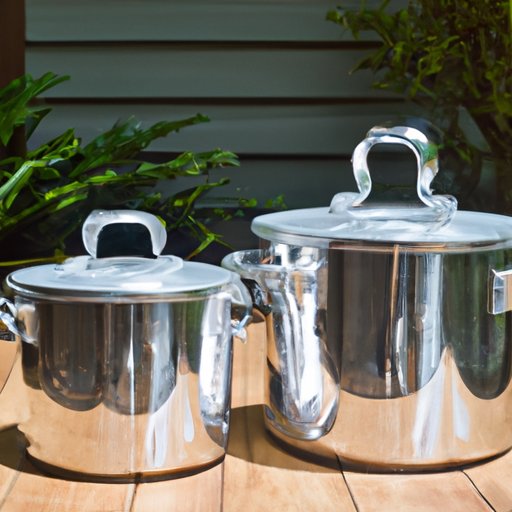Introduction
Aluminum cookware has been a kitchen staple since the early 1900s. It’s an affordable and durable option that can be used in a variety of cooking methods, from baking to boiling. But despite its popularity, there are still some safety concerns surrounding aluminum cookware. In this article, we’ll explore the safety issues of cooking on aluminum and provide an in-depth guide to help you make an informed decision about whether or not to use it in your kitchen.

Background Information on Aluminum Cookware
Aluminum is one of the most abundant metals on earth and is widely available in nature. It is lightweight, malleable, and resistant to corrosion, making it an ideal material for cookware. Aluminum is also a good conductor of heat, which means it heats up quickly and evenly. This makes it ideal for cooking and baking applications. However, aluminum is also reactive with certain foods and liquids, which can cause it to discolor or even leach into food.
Overview of the Safety Issues Surrounding Aluminum Cookware
The safety of cooking on aluminum has been debated for decades. While some believe that it’s perfectly safe to use, others are concerned that aluminum may leach into food and potentially cause health problems. So what’s the truth? Let’s take a look at the facts.

Investigating the Safety of Cooking on Aluminum: A Comprehensive Guide
Analyzing the Pros and Cons of Aluminum Cookware
Aluminum cookware has its advantages and disadvantages. On the plus side, it’s lightweight and easy to handle, so it’s perfect for busy cooks who need to move their cookware around easily. It’s also very affordable, so even those on a tight budget can enjoy its benefits. Finally, aluminum is an excellent conductor of heat, so it’s great for getting evenly cooked food quickly.
On the downside, aluminum is a reactive metal, meaning it can react with certain acids and alkalis. This can lead to discoloration or even leaching of aluminum into food, which some people are concerned about. Additionally, aluminum is not as durable as other types of cookware, such as stainless steel, so it may not last as long.
Examining the Potential Health Risks of Cooking on Aluminum
One of the biggest safety concerns surrounding aluminum cookware is the potential health risk. Studies have shown that when aluminum is heated, it can leach into food, particularly acidic or alkaline foods. Some studies have linked aluminum exposure to a variety of health conditions, including Alzheimer’s disease, autism, and kidney disease.
However, it’s important to note that these studies were inconclusive. The amount of aluminum that leaches into food is extremely small and is unlikely to pose any significant health risks. Furthermore, the World Health Organization has stated that aluminum is not a known human carcinogen and that current levels of aluminum exposure from cookware are not considered dangerous.

What You Need to Know About Cooking on Aluminum
Exploring the Safety Issues Surrounding Aluminum Cookware
When it comes to cooking on aluminum, there are a few things you should keep in mind. First, avoid cooking acidic or alkaline foods in aluminum cookware. These foods can react with the aluminum and cause it to leach into the food. Additionally, avoid cooking on scratched or damaged aluminum cookware, as this can also increase the amount of aluminum that leaches into food.
Finally, if you’re worried about aluminum leaching into your food, opt for anodized aluminum cookware. Anodizing is a process that seals the surface of the aluminum, reducing the amount of aluminum that leaches into food.
Debunking the Myths and Facts About Cooking With Aluminum
There are a lot of myths and misconceptions about cooking with aluminum. One common myth is that aluminum cookware causes cancer. This is false. As mentioned earlier, the World Health Organization has stated that aluminum is not a known human carcinogen and that current levels of aluminum exposure from cookware are not considered dangerous.
Another myth is that aluminum cookware is unsafe for everyday use. This is also false. As long as you follow the safety tips outlined above, aluminum cookware is perfectly safe to use. In fact, it’s one of the most popular types of cookware available.
Assessing the Risks of Cooking on Aluminum Pans and Pots
The biggest risk associated with cooking on aluminum is that it can leach into food. However, the amount of aluminum that leaches into food is extremely small and is unlikely to pose any significant health risks. Additionally, there are steps you can take to reduce the amount of aluminum that leaches into food, such as avoiding cooking acidic or alkaline foods and using anodized aluminum cookware.
Conclusion
Overall, cooking on aluminum is generally considered safe. Although there are some safety concerns surrounding aluminum cookware, the amount of aluminum that leaches into food is extremely small and is unlikely to pose any significant health risks. Additionally, there are steps you can take to reduce the amount of aluminum that leaches into food, such as avoiding cooking acidic or alkaline foods and using anodized aluminum cookware.
So if you’re looking for an affordable and durable option for your kitchen, aluminum cookware is certainly worth considering. Just remember to follow the safety tips outlined above to ensure that you’re using it safely and responsibly.


